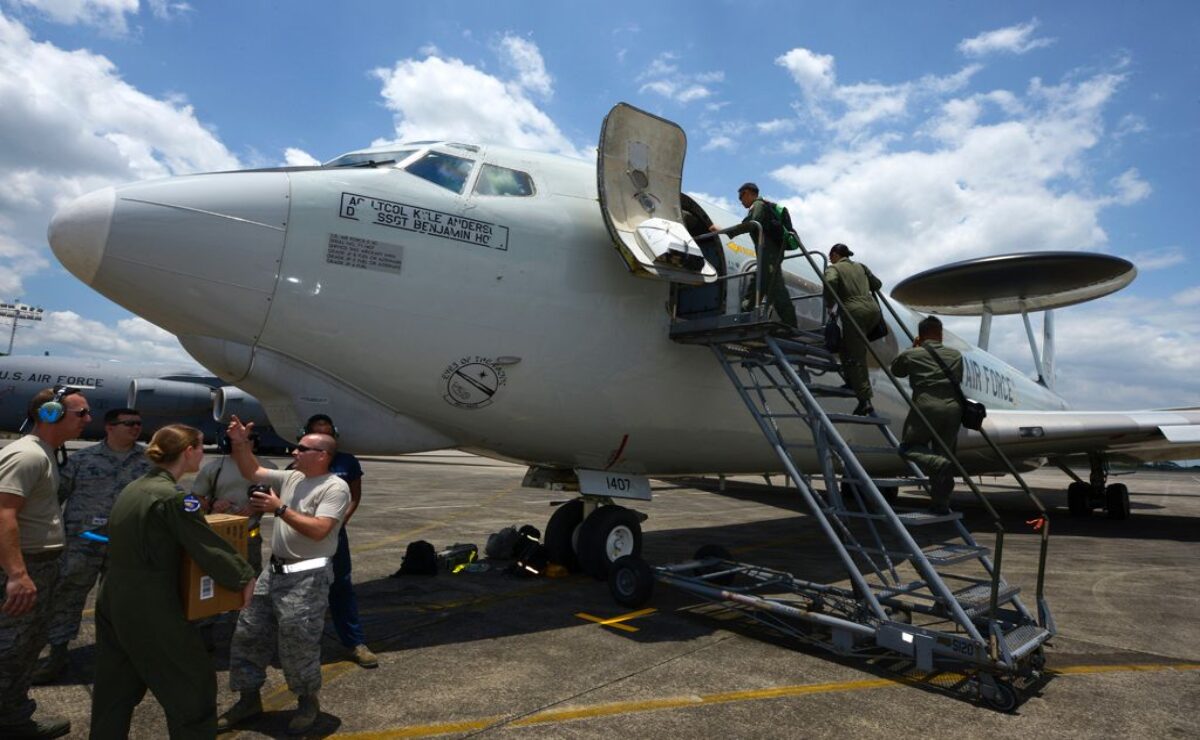West PH Sea: PAF proposes purchase of ‘flying radars’ amid woes

E-3B Sentry, an airborne warning and control system of the U.S. Air Force’s 961st Airborne Air Control Squadron, used during the 2015 Balikatan exercises in May 2015. (U.S. Air Force photo by Staff Sgt. Maeson L. Elleman)
MANILA, Philippines — The Philippine Air Force (PAF) has proposed the acquisition of a “flying radar” to enhance its capability to detect enemy aircraft, drones, and missiles amid ongoing Chinese aggression in the West Philippine Sea.
PAF spokesperson Col. Maria Consuelo Castillo said the proposal is part of the “Re-Horizon H3” capability list under the third phase of the Armed Forces of the Philippines’ modernization program.
READ: Eye in the sky: Air Force’s bid for ‘flying radar’ system gets new push
“The PAF has proposed to higher offices the possible acquisition of the Airborne Early Warning and Control (AEWACS),” Castillo told the Inquirer in a text message on Tuesday.
Castillo noted that the AEWACS would provide airborne surveillance, command, control, and communications capabilities, enabling a comprehensive air battle management system.
She declined to provide further details, deferring to the Department of National Defense (DND).
It was DND Secretary Gilberto Teodoro Jr. who initially raised the possibility of acquiring such equipment, emphasizing that the capabilities of the proposed multirole fighter jets could not be fully maximized without it.
Currently, the PAF has around a dozen FA-50 fighter jets in its fleet.
In 2023, PAF officials inspected the Swedish-made Saab 340 flying radar system during a visit to Saab facilities.
However, the deal had not yet been on the table when the DND announced the latest developments in its negotiations with Saab last year regarding the acquisition of multirole supersonic fighter jets.
READ: Fighter deal with Sweden moves forward, says DND
The PAF has several radar systems nationwide.
The most modern among them is the Japanese-built air surveillance radar system at Wallace Air Station in La Union, designed to detect aerial and naval threats from the West Philippine Sea.
Inaugurated in December 2023, the system features an active electronically scanned array, an instrumented range of over 300 nautical miles, a 95 percent detection probability, and capabilities for both air defense and ballistic missile defense, according to the PAF.
READ: PAF acquires sharper eye for threats in WPS
Beijing has taken aggressive actions against the Philippine Coast Guard, Navy, and fisherfolk in asserting its sweeping claims over nearly the entire South China Sea.
However, a historic arbitral tribunal ruling effectively dismissed these claims, affirming Manila’s sovereign rights in the western section of its exclusive economic zone.
In what former Foreign Affairs Secretary Enrique Manalo described as an unprecedented escalation, Chinese navy jets fired flares into the path of a PAF NC-212i aircraft during a patrol over Scarborough (Panatag) Shoal—one of the region’s key flashpoints—on August 8, 2024./mcm/abc
For comprehensive coverage, in-depth analysis, visit our special page for West Philippine Sea updates. Stay informed with articles, videos, and expert opinions.


















